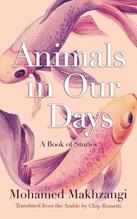
|
|
| (photo: New York University) | |
Chip Rossetti is a translator of Arabic literature and editorial director for the Library of Arabic Literature bilingual book series at NYU Press. Books he has translated include Beirut, Beirut by Sonallah Ibrahim; the graphic novel Metro: A Story of Cairo by Magdy El Shafee; Utopia by Egyptian science fiction pioneer Ahmed Khaled Tawfik; and No Windmills in Basra, a collection of flash fiction by Iraqi writer Diaa Jubaili (Deep Vellum, August 2, 2022). He translated Animals in Our Days by Egyptian writer Mohamed Makhzangi (Syracuse University Press, June 14, 2022), a story collection that traces the mystical, almost supernatural, connections between our species and others.
Handsell readers your book in 25 words or less:
Haunting Egyptian stories--each about a different animal--on humanity's need to regain the awe and humility that once characterized our relationship with other species.
On your nightstand now:
At the moment, I'm just finishing Muhsin al-Ramli's The President's Gardens, translated by Luke Leafgren. Al-Ramli deftly balances a story of three lifelong friends in an Iraqi village with some of the most harrowing events of Iraq's recent history. I'm also rereading a novel that I enjoyed as a teenager: Satyrday, by the poet Steven Bauer. It's a dark folktale involving a villainous owl that steals the moon from the sky in a world full of talking animals, including, naturally, a satyr. It reads like a grimmer C.S. Lewis, and I wish it were better known. Up next is Emily St. John Mandel's Sea of Tranquility. I loved The Glass Hotel, but I may be the only person on the planet who has not read (or seen) Station Eleven. I promise I'll get to it eventually.
Favorite book when you were a child:
Hands down, D'Aulaires' Book of Greek Myths. I can still recall the day I was taken to a bookstore for my sixth birthday to pick out a present for myself. That was the book I chose. It's a fantastic introduction to the stories, and in the best tradition of children's books, the illustrations left a deep impression on me and are now permanently imprinted in my brain. I'm happy to say I still have my copy after all these years--although its jacket has long since been lost--and that my sons love it as much as I did.
Your top five authors:
In no particular order: Viet Thanh Nguyen, for his razor-sharp (and very funny!) fiction on the head-spinning aftermaths of war and colonialism; Gamal al-Ghitani, for the remarkable variety of his novels, from mordant historical fiction to mystical works and social satire on Egyptian life; Anne Carson, as both poet and translator; Sam Lipsyte, whose novels make me laugh out loud; and Ian McEwan.
Book you've faked reading:
I'm embarrassed to say that I didn't read Jorge Luis Borges until late in life, but I'd had plenty of conversations where I would knowingly nod my head when his name came up. In graduate school, I realized that the subject of my dissertation, the Iraqi writer Muhammad Khudayyir, wrote books that were very much in conversation with Borges's. That prompted me to finally buy a copy of Borges's Collected Fictions, translated by Andrew Hurley, and discover the brilliance I had been missing out on.
 Book you're an evangelist for:
Book you're an evangelist for:
Where to start? Pushing my favorite books on friends and acquaintances is a personal hobby of mine, but if I have to pick one, I choose the novel Wûf by Kemal Varol, translated from Turkish by Dayla Rogers. As with Makhzangi's Animals in Our Days, it foregrounds animals in a story about human folly and brutality. It tells the story of the Kurdish uprising in southeastern Turkey and its harsh military suppression, from the point of view of a dog narrator--an older, partially paralyzed hound with a world-weary point of view and a delightful penchant for smoking cigarettes.
Book you've bought for the cover:
Strange Beasts of China by Yan Ge, translated by Jeremy Tiang. The blood-red moon in a starry sky over city lights was irresistible. The novel itself, about a Chinese cryptozoologist and the near-human species that populate her city, is just as good.
Book you hid from your parents:
I can't recall hiding books from them, but I certainly raided their library quite a bit in high school and college, which introduced me to writers like Dostoyevsky and Tolstoy, as well as mid-century classics like Albert Camus's The Plague and William Shirer's The Rise and Fall of the Third Reich.
Book that changed your life:
As an undergrad classics major, I took a seminar on Herodotus's Histories, a text that touched a nerve with me. Straddling the unstable border between history and legend, the Histories opened up my lifelong interest in travel writing, both ancient and modern. I later discovered the riches of geographical and travel writing in Arabic (Ibn Battutah, Ibn Fadlan) and of the Islamic Middle East more broadly (Evliya Çelebi, Nasir-i Khusraw). I'm currently translating an Arabic text on the "wonders of the world" by Abu Hamid al-Gharnati, a 12th-century Andalusian who traveled as far as central Russia and Hungary, and who no doubt would have gotten on famously with Herodotus, if only the two of them could have met.
Favorite line from a book:
The final line of the novel Basrayatha by Muhammad Khudayyir, translated into English by William Hutchins. Some set-up: the book is Khudayyir's homage to his hometown of Basra, depicted as a palimpsest of histories and memories that stubbornly endure in spite of the best efforts of war, time and officialdom to erase them. In the last scene, as the narrator walks through the bombed-out city at night, he hears music playing in the empty street, a joyous ghostly symphony celebrating the city's survival. The final lines read: "The city repeats the song. The city is dancing. It strips itself to fly. The dead emerge from the netherworld and share in the singing." It never fails to send shivers up my spine as a depiction of hope against loss and forgetting.
Five books you'll never part with:
The Travels of Ibn Battutah, edited by Tim Mackintosh-Smith
The Leopard by Giuseppe di Lampedusa
The Alexandria Quartet by Lawrence Durrell
West with the Night by Beryl Markham
Impostures by the 11th-century Iraqi author al-Hariri, translated by Michael Cooperson.
Book you most want to read again for the first time:
Another childhood favorite, which I checked out multiple times from my school library: Detectives in Togas by Henry Winterfeld, a story of Roman schoolboys solving a mystery to clear their classmate's name. If I could have lived in a novel as a child, it would have been that one. Winterfeld wrote in German and had an old-school classical education, but only as an adult did I learn that this author from another era was in fact a German Jewish refugee from the Nazis who lived only one state over from me.
Five translations of contemporary Arabic fiction you recommend for a beginner:
Frankenstein in Baghdad by Ahmed Saadawi, translated by Jonathan Wright
The Queue by Basma Abdel Aziz, translated by Elisabeth Jaquette
Season of Migration to the North by Tayeb Salih, translated by Denis Johnson-Davies
The Story of Zahra by Hanan al-Shaykh, translated by Peter Ford
Death Is Hard Work by Khaled Khalifa, translated by Leri Price

